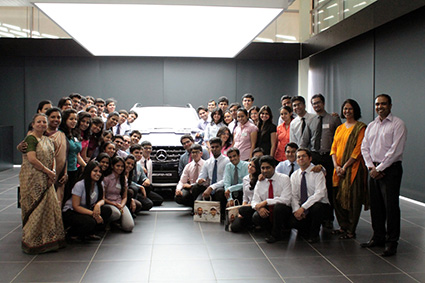The WIRTGEN GROUP, headquartered in Germany, is the World’s No. 1 in the field of mobile Road Construction and Road Rehabilitation equipment. The group of companies presents itself with its strong c... read more

The level of excitement and fun at Indo-German Training Centre, Mumbai just doesn’t end until the last moment. After the completion of the Phase II exams, probably the most power packed and rigorous phase, IGTC Management decided to reward the students for their hard work by organizing an Industrial Visit. The students were brimming with excitement when they learnt that they would be visiting the two giants of the automotive industry – Mercedes-Benz India and Volkswagen India – which deliver and portray exceptional German quality standards. Here is a review of the visit from the perspective of the IGTC students:
“The very first sight of the Volkswagen plant, which is spread over an area which is almost equivalent to 7 football fields, gave us an idea of how exciting and interesting the next few hours are going to be. Mr. Chaitanya Halbe from the Corporate Communications department of Volkswagen India welcomed us and gave us a briefing on the agenda of the Industrial tour. To start with, we were shown videos of the Volkswagen manufacturing facility and their manufacturing technologies. We were told some interesting facts during the briefing session that the plant is constructed in a record period of 17 months and also that currently the plant works for two shifts and the third shift is used for maintenance. This reminded us of our lecture in Operations Management by Moradian Sir in which he had mentioned about the Japanese production system and the concept of Cost of Quality. Also, we couldn’t help relating to the lecture in Financial Management by Fakih Sir when we tried to understand how Volkswagen would have done the exercise of capital budgeting for this manufacturing facility having state-of-the-art technology.
After the briefing, we were taken into the manufacturing plant. We were shown the working of a robot which was designed and manufactured by Kuka Robots for Volkswagen. This robot was used for making the sub-assembly of car doors. Along the assembly lines were bins in which the material was being fed by the line feeding team. Also, we were informed that the materials are classified into different categories based on their value and properties and most of them are procured on the basis of a Just-In-Time philosophy. Dr. Suhas Rane had recently taught us Materials Management in which we had learnt in detail about the techniques of categorisation and storing of materials. Also the fact that Logistics functionality is outsourced by Volkswagen to Mahindra Logistics related to what we had learnt in Strategic Management by Dr. Macario Fernandes. We learnt that companies should focus on the core competency and should not invest much on the non-core competency activities. It also very well connected with the concept of 3rd party logistics which we learnt in Supply Chain Management. After the factory visit, Mr. Chaitanya Halbe patiently answered all our diverse questions regarding the marketing initiatives by the company, quality policy of the company, manpower management and future plans of the company, etc.
After visiting Volkswagen, we were even more excited to visit the world’s most admired luxury car brand, Mercedes-Benz. We were asked to be seated in the Excellence Centre of Mercedes-Benz, India. It is a luxurious auditorium, where the company conducts corporate, media and promotional events, and where 5 Mercedes-Benz cars such as S 350, SLK, ML Class, etc. are kept for the purpose of display on podiums. We were welcomed by Ms. Colleen D’Souza and Mr. Thomson Xavier from the Human Resource team at Mercedes-Benz. The interaction started with the history of the company and its existing business across the globe.
We were split in groups and were sent on the shop floor, wherein we saw similar processes being followed in terms of line feeding and inventory management. In addition to that we saw a few charts, and particularly one of them caught our attention. The heading was Flexibility Matrix. This chart contained information on the operator that is assigned to a particular type of job on a particular line. This immediately reminded us of the Assignment Problem, which we had recently learnt to solve in Operations Research, taught to us by Ms. Chitra Chandrashekhar. In addition to the regular processes, we also saw the different quality audit processes and quality control systems being followed at Mercedes-Benz. This plant is a completely knocked down (CKD) and semi knocked down type of manufacturing plant. There are also suppliers around the company who also procure parts in the form of CKD from Daimler AG and assemble it and supply the sub-assemblies to Mercedes-Benz India. We got an opportunity to see the real time usage of SAP – the ERP package implemented in Mercedes-Benz. Finally, to add to our excitement we were shown the working of a convertible SLK Car and the floor was left open to all of us to experience and click our dream photographs with the cars.
Overall, the Industrial visit gave us an opportunity to actually see and experience for ourselves the application of the theory which we study in the classroom. This is what makes IGTC – a training centre with a remarkable difference!”